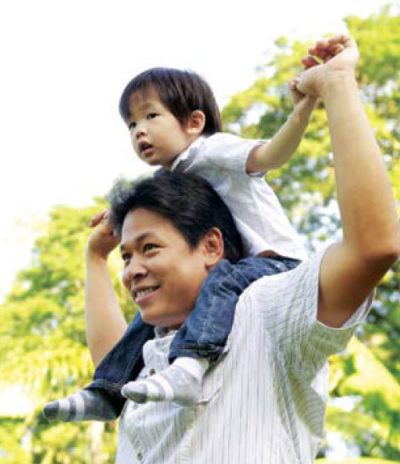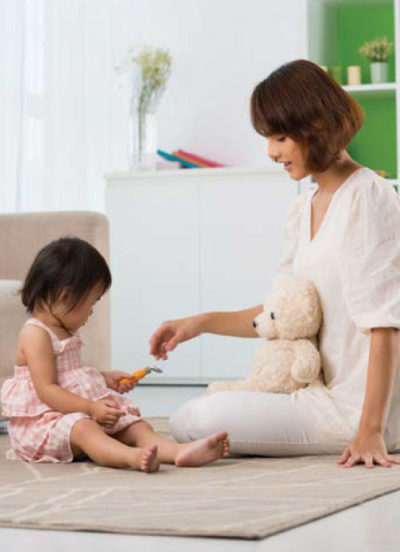Developmental Milestones are specific markers used to measure a child’s growth in four primary areas of development, namely speech/language, cognitive/intellectual, social/emotional, and fine/gross motor development. These are further divided according to the child’s age range, e.g. 0-5 months, 5-8 months, and so on. They give parents, caregivers, and paediatricians a yardstick to measure whether a child is “on target” in their development compared to other children of the same age.
Start Early
As your child’s social and emotional development has its roots in your relationship, it is critical to establish a healthy parent-child bond as early as possible. Bear in mind that these bonds also set the stage in developing his emotional well-being and social relationships in later life.
Starting from infancy, you should be open, responsive, and sensitive to your child in order to encourage higher levels of trust and attachment. In turn, this helps create a strong parent-infant bond that would lead to a more independent child who is able to express himself.
Parental Involvement Required
Parents and families are the first ‘teachers’ in a child’s life. While the parental role is filled with many challenges, you can create stability in your child’s life by establishing routines. These include things such as taking meals together, giving baby a massage before naps/bedtime, or fixed bed-times.
Bonding with your baby leads to a powerful, lasting connection. This is important as it provides your baby with his first experience of an intimate relationship, thus building security and positive self-esteem.
This initial bond can impact his social and cognitive development at a later age. As parents, you will need to commit to spending both time and energy with him. That being said, as long as either parent can bond with your baby, he will have the closeness and support to promote healthy growth and development. Make eye contact and facial expressions such as smiling and nodding. Respond to baby’s cooing with simple replies such as “You’re talking!” and singing to encourage communication.
Physical affection such as cuddling, gentle touching and holding makes baby feel loved, safe and secure. However, in the event that you are having trouble bonding with your baby, do discuss any concerns you may have with his paediatrician. It may be due to postpartum depression, exhaustion, or feeling overwhelmed. Regardless of the reason, quickly identify the problem and resolve it fast.
“An essential part of growing up, play is an excellent way to bond with your child. It helps him to develop his social, emotional, cognitive, and physical skills by engaging in it. Playing with others also helps him become more resilient by learning how to work or negotiate with others and to overcome challenges. Ultimately, playing helps expand his creativity.
As parents, play is a perfect chance for you to be completely involved with him and a means to strengthen the parent-child bond. Observe him as he plays, or better yet, join in the fun! Viewing the world through his eyes allows you to better communicate with him.
Pay close attention as your child may find it easier to express his emotions through play. Best of all, by immersing yourself in his world, you show him that you care and that he has your full attention.”
“Spending time with your child is an important aspect that helps form strong emotional attachments. Both quality and quantity of time are important; think of them as both sides of a coin. Here are some simple tips for busy parents of young children:
Pick one day of the week for family time. Put aside your work and get the whole family to join in for some fun; it could be a board game, movie night, outing to a local park, or whatever your kids love.
Little helpers – once your child is old enough, get him to help out with whatever household chores you are doing. The focus here is on working together as a team, not on getting the work done fast.
Have as many family meals together as humanly possible! Nothing sets the tone for family togetherness better than having a good chow down with the whole family. It doesn’t have to be restricted to dinnertime; mix things up a little and have high tea instead on lazy Saturday or Sunday afternoons. There should also be a ban on the use of digital gadgets during family meals!”
Encouraging Independence
As your child grows, he will start showing some signs of independence. While parental involvement is a necessary component, you must learn to balance your desire to parent against his need to exert himself. This is one of the biggest parenting challenges; knowing when to step in and when to let him figure things out.
An analogy to illustrate the importance of this principle is the story of the struggling butterfly that is slowly emerging from its cocoon. Helping it out of its cocoon leads to a butterfly with malformed wings – it is during the butterfly’s struggle to emerge from its cocoon that fluids are forced into its wings, causing them to stretch and open them. This classic story illustrates the importance of taking a step back and allowing children the opportunity to learn through their own experiences.
Dr Raja Juanita says…
“There is such a thing as too much parenting. The results of over-parenting can be seen in some of today’s youths. Children who are over-parented grow up with less resilience and a sense of entitlement. They may not be able to cope with difficulties, poor sense of responsibility, and may suffer from high anxiety. Actions that may indicate over-parenting include:
- babying’ an older child (carrying him instead of letting him walk, cutting his food for him, etc.)
- placing many restrictions, especially an older child (e.g. not allowing him to get his driver’s licence as ‘driving is too dangerous’)
- not allowing children to face the consequence of their actions (e.g. parents may blame others even if their child is wrong)
- overprotective parents who demand that teachers give the child concessions (e.g. for not doing homework or school project) despite no rational reason for not completing it
- insisting on being involved in their child’s social circle (e.g. the ‘best friend parent’ instead of ‘parent’)
- leaving the child with no ‘alone’ time, i.e. the child has little to no privacy
- micromanaging the child’s activities and taking over responsibilities
- telling the child what to do instead of guiding him
These are just some of the examples! At the end of the day, your role as a parent is to prepare your child to face the world on his own. While you should certainly provide him with shelter and security, this should not be done at the expense of his ability to function as an adult in future.”
The term “helicopter parenting” is used to describe over-protective parents who practically hover over their child.
This can be counter-productive in the long term. While parents certainly do need to keep a close eye on infants and toddlers, this may spiral out of control and turn into over-protectiveness.
Dr Rajini Sarvananthan says…
“As parents, you should remember that your strength is the result of your own childhood struggles. Parenting success is not about how much you do for your child, it is about how well you can teach him to act on his own. Shielding your child from the harsh realities of life may seem like a good idea, but in actual fact, you are depriving him of lessons in problem-solving.
It is perfectly alright for your child to feel anxious, be concerned, or even go through the disappointment of not getting what he worked for. Life is filled with ups and downs, and learning to face and deal with the uncertainties when he is down is actually a vital skill!
Here’s some tips to prevent helicopter parenting:
- Stop and take stock: before you charge in to rescue your child from every single demanding situation, take a quick analysis first. Provided his life is not in immediate danger or he is not about to hurt himself or others, allow him to explore things on his own. Resist the urge to ‘save’ him every time.
- You are his parent, not his best friend: as your child grows, so does his need for privacy and his own social circle. Avoid infringing on his personal space excessively. While worries about cyber bullying or predators on the internet are valid, it is by far more important to empower your child to do something about it.
- Disguised learning opportunities: mistakes help him grow so instead of ‘saving’ him, encourage him to keep trying to solve them on his own. This helps build his resilience and perseverance; rushing to his rescue denies him the opportunity to develop these critical life skills, which will prove detrimental once he is an adult.”
Ms Loh Sit Fong says…
“Little or limited parental involvement can lead to problems with self-esteem or self-confidence later in life. Strangely enough, over-involved parents can also cause this dilemma. Although the root cause in both instances is different, the end results are the same.
It’s important that as parents, you are there for your child when he needs your support, be it emotional, financial, or support in any other form or manner. You should also be comfortable to take a step back and allow him to make his own decisions and face his own struggles, failures and successes. It is this balance that plays a pivotal role in allowing your child to discover his own self and inner strength, thus allowing him to develop his own self-confidence and self-esteem.
Ultimately, he has to learn how to deal with the world on his own. As he grows and matures, your role will gradually change from protector to advisor.”
Helicopter parenting can be a problem as it can hinder his future development as he grows.
To get him ready to be independent, it is vital that you coach him in preparation rather than buzz overhead. Put him in charge of specific household chores such as clearing the dishes or feeding a pet. Giving him a chance to take ownership of certain ‘jobs’ helps build up his confidence and self-esteem.
The harsh reality of life is that as parents, there will come a time when your child will need to stand on his own. Thus, it behoves us as parents, to raise an independent and responsible adult who is able to make mature and rational life-decisions. Part of loving your child is knowing when to let go, so focus on empowering him in preparation for adult life.
















Comments